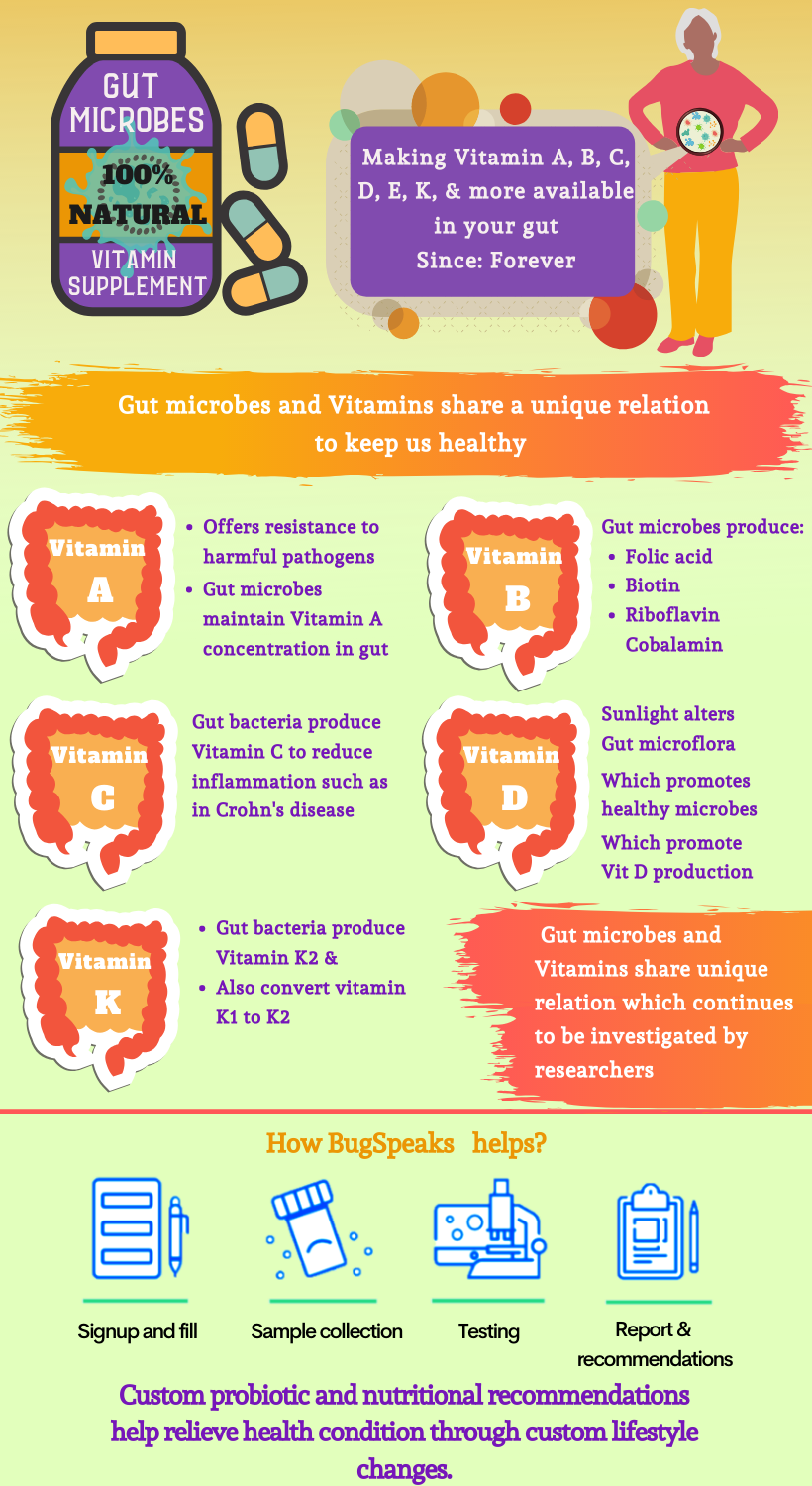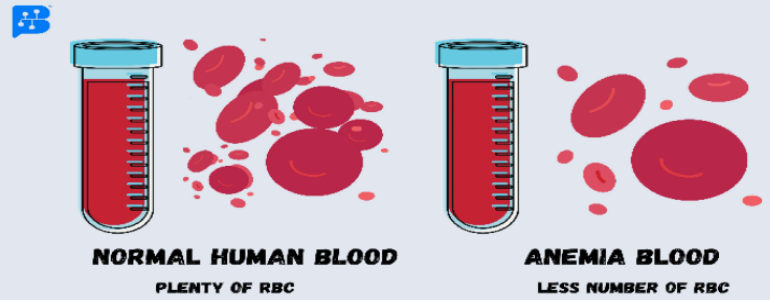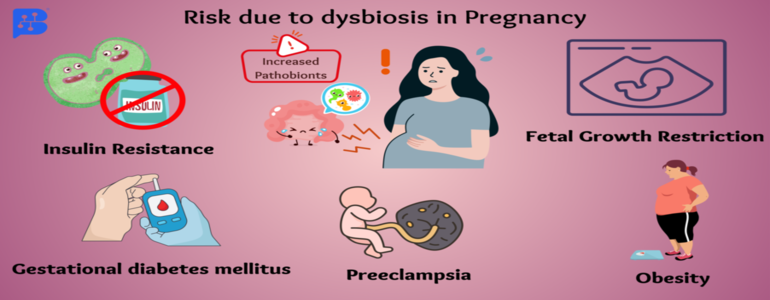- Dec. 19, 2019
- BugSpeaks
- Microbiome, Nutrition, Diet and Supplements
Natural Gut microbiota as an alternative to Vitamin supplements??
Our gut serves as a natural habitat for trillions of micro-organisms. To keep us healthy the delicate balance of gut microbiota needs harmonious balancing. Gut microbiota, managed by the mucosal barrier, draws a sort of boundary between these tiny tots and us. One of the countless ways these tiny tots help us includes providing several enzymes usually not encoded by our genome. These include the enzymes involved in the breakdown of polysaccharides, polyphenols, and synthesis of most of the vitamins. Vitamins or micro-nutrients are biomolecules that act typically as cofactors / co-enzymes for several different enzymatic reactions associated with metabolism and other functions of the body. As these little metabolic machineries share unique relation with our micronutrient requirements, an insight into their working take on a high degree of curiosity.
Gut microbiome and Vitamin A
Vitamin A or retinoic acid is essential for healthy skin, teeth, skeletal muscle, soft tissue, mucous membrane, central nervous system, and others. Trillion of gut microbes residing in intestinal mucosal lining metabolize Vitamin A obtained through food. One such relationship exists with commensal bacteria of Clostridia class control vitamin A concentration in the gut. In turn, Vitamin A offers higher resistance to colonize the potential pathogens like Salmonella Typhimurium. Vitamin A thus plays an important role in homeostatic interactions between the host and the microbiome.
Gut microbiome and Vitamin B
Most of the essential vitamins produced by our gut flora typically belong to the B group of vitamins, like, thiamine (B1), riboflavin (B2), niacin/ nicotinic acid (B3), pantothenic acid (B5), pyridoxine (B6), biotin (B7), folic acid (B9) and cobalamin (B12).
Folic acid produced by Lactobacillus and Escherichia coli is the most crucial member of the B vitamin family. It is vital for our genetic machinery as it takes a vital role in the biosynthesis of the purines and pyrimidines, the basic building blocks of DNA and RNA.
Riboflavin or vitamin B2, yet another vital vitamin, acts as co-enzymes in various vital reactions in cells. While biotin also belonging to B vitamin family helps convert food into energy in mitochondria. A group of useful microbes, Bacteroidetes, Fusobacteria, and Proteobacteria, harbouring in our intestine own the complete pathway essential for the production of riboflavin and biotin biosynthesis.
Another member of the group is cobalamin or Vitamin B12. It is a vital micro-nutrient that is responsible for healthy nerve and blood cells. There exists symbiosis or interdependence between us and the cobalamin producing gut micro-flora. For example, Fusobacteria, Pseudomonas, and Klebsiella sp, present in the gut produce vitamin B12. Thus, the microbes aid us by producing cobalamin in the gut. On the other hand, cobalamin protects, preserves, and revives the mucous membrane, the home of the whole microbial community.

Gut microbiome and vitamin C
Vitamin C has numerous health benefits. So, we find ways to incorporate it into our diet, either by taking supplements or having foods loaded with vitamin C. It boosts our immune system and acts as a critical co-enzyme dealing with oxidative stress and scavenging free radicals. Burkholderia, Pseudomonas, and Erwinia reside in the gut of normal healthy individuals. In the case of people suffering from Crohn’s disease, an inflammatory bowel disease, these bacteria gain the capability of producing vitamin C, helping reduce inflammation. However, these bacteria in normal conditions are incapable of producing vitamin.
Gut microbiome and vitamin D
Everyone knows about the relationship between sunlight and Vitamin D., But a recent Canadian study sheds light on the plausible association between microbes, vitamin D, and sunlight. Findings suggest that exposure to sunlight, more precisely, UVB light can change the human gut microbiome. This alteration is more evident in vitamin D deficient people. Sunlight/ UVB light through the synthesis of vitamin D helps maintain healthy bones and teeth.
This vitamin also alters gut flora and helps to overpopulate the number of healthy bacteria present in our digestive tract. Enrichment of the good bacterial family of Lachnospiraceae and Firmicutes and the decline of bad Bacteroidetes in the gut following exposure to sunlight has been observed. Thus, Lachnospiraceaes and Firmicutes group of bacteria often present themselves in the gut of healthy individuals. Whereas, the people suffering from various inflammatory diseases lack the previously mentioned microbes in their gut.
Gut microbiome and vitamin E
Lack of Vitamin D renders the body prone to inflammatory diseases, while a lack of Vitamin E or ∞-tocopherol can impair antioxidant activities in our body that helps us get rid of the free radicals. These free radicals are otherwise detrimental to our health. However, the role of such a critical vitamin on gut microbiota composition and vice versa is still under characterized. Korean researchers showed an association between an altered gut microbiome composition and a low intake of vitamin E in mice. Hopefully, more studies in the future will help delineate the effect of vitamin E on the intestinal flora.
Gut microbiome and vitamin K
To help you control blood loss upon injury Vitamin K comes to rescue. It is an essential factor for blood coagulation and also helps in the calcification of bones. Vitamin K comprises of two structurally similar isoforms: vitamin K1 and vitamin K2. We get vitamin K1 through the green leafy vegetables, which we eat. However, for vitamin K2, we are dependent on our gut bacterial community. Our intestinal flora converts vitamin K1 to K2. Escherichia coli and Lactobacilli present in our gut can also bio-synthesizes vitamin K2. However, vitamin K1 is not produced in our gut.
All the evidentiary material glorifies the intricate relationship between microbes and vitamins. The composition of the human gut microbiota, as established during the early years after birth, gets altered over time. However, under the influence of lifestyle factors and usage of drugs and antibiotics, the composition of gut bacterial species could go down the wrong road. Such changes may alter biosynthesis of vitamins, which are essential for our metabolism, adversely.
To conclude,
So, for an ample supply of the essential vitamins vital for a healthy life, we need healthy gut flora. If a vitamin deficiency is caused by various reasons, to deal with it in a better way, a ‘Gut Microbiome Test’ can always help. In this process, with the help of cutting edge ‘DNA sequencing technology,’ the array of your unique gut microbiome will be identified and mapped from your faeces sample. Based on this, a tailor-made diet plan will be recommended to you. As it takes a while to change your gut microbiome, you must be patient to get good results.








